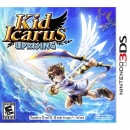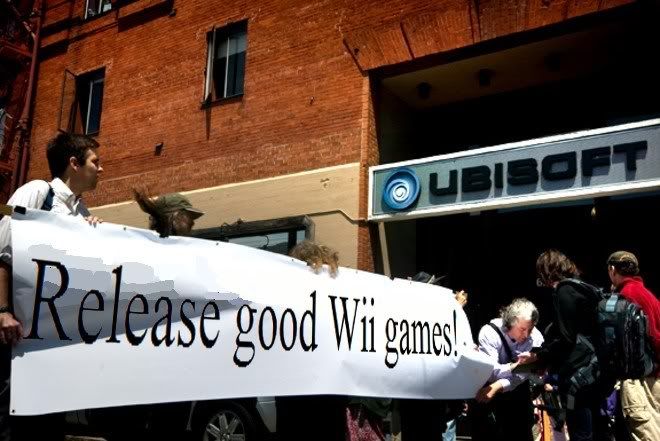Bobbuffalo said:
@noname2200: good point. I bet that's one of the up/downs of a broad audience.
But we shouldn't forget that 3d parties tend to make the wii versions of their games inferior to the other ones because they don't treat the wii seriously (alone in the dark, dead rising come to mind). |
Warning! Absurdly long post ahead! Short version follows. :
You're definitely right there. And third-party efforts are decidedly sub-par at the moment. But with the right strategy, third-parties can levy the Wii to good short-term and great long-term profits. Unfortunately, they probably won't plan that far ahead. In fact, for many third-parties it may be so late in the game that they're better served by sticking to what they're doing now, and praying they don't go bankrupt in the next few years.
Short version is probably all you need to read. Long version rambles a lot, and is more of an ego-trip for me than it is a useful or insightful post. If I was you, the reader, I'd skip it. Having given fair warning...longer version follows:
Too true, and I'm pretty sure I phrased my earlier post too broadly. To refine what I said earlier, the "garbage in, garbage out" maxim still applies to the Wii (hear that, Ubisoft?). And making a better product will likely build up your fanbase over time, which is a huge long-term benefit.
But I don't think that if a third-party suddenly re-tooled itself to make traditional titles for the Wii with the same amount of time and effort as they do with HD consoles, it would automatically and immediately follow that they will see the same level of success that they do on the HD consoles.
So far, the demographic that traditional games appeal to (13-25 males) don't seem to be on the Wii in as large a number as they are on the HD consoles. While the number of such on the Wii is not insignificant (see, e.g., Brawl's sales), and while I'm positive that they too will gravitate towards the system in increasing numbers as time goes on (a la the DS) there are not enough on the system right now to give traditional third-party Wii titles massive sales. I expect The Conduit and Mad World to be quite profitable, for instance, but unlike others I don't think they'll go platinum.
But what they WILL do is attract more people in that demographic to the system, so that the next titles will do better (assuming the quality is still there). And when Nintendo gets around to going for traditional gamers with gusto (2010, perhaps?) I expect such titles to really start taking off.
In short, while the base for traditional games is solid on the Wii at the moment, first-and-third parties would be best served by taking pains to slowly grow it, starting with mid-budget titles that take advantage of the Wii's revolutionary controls and slowly expanding their teams and budgets over time. This will ensure they get the steady profits they need to grow, and that they are large and experienced enough at the end of the process to start cranking out proper AAA Wii games.
Alternatively, they could take a page from Nintendo's book, and start focusing on making "bridge" games, which would be the best outcome for us gamers in the long run. But that's all but certain to NOT happen: such a strategy takes an organization-wide focus and concentration to pull off properly, and Nintendo's the only one with enough interest in doing so on its systems to make it worth revamping their entire organization. More to the point, it took five years for Nintendo to reach this stage of preparation; if any third-party tried to mimic them now they'd be wasting billions in trying to reach a ship that will have already sailed.
But your post makes a great point about how third-parties will not go about achieving these modest short-term and massive long-term profits. The current focus that companies like Activision have of making a Wii version of their HD games will never lead to the result outlined above. Again, those games are meant to appeal to traditional gamers, and they're often inferior to their HD counterparts because they lack the latters' graphical, online, and processing prowess, while not taking sufficient advantage of the Wii's unique strengths. Presented with such a choice, is it any surprise that most traditional gamers pick the HD version over the Wii one? And this will not lead to long-term growth. It is not, however, completely useless: by offering Wii-only owners a decent chance to play a fascimile of an HD game on their Wii, these ports can act as a sort of plug that prevents more traditionally-oriented gamers from abandoning the Wii altogether in the short term.
Of course, that grand vision I have of long-term success is probably not going to happen without Nintendo forcing the matter. As you said, too many third parties don't take the system seriously. While Japan is increasingly shifting to the Wii, and small and mid-sized Western developers are going to it from sheer necessity, it is feasible that the larger Western publishers will always treat the Wii as the red-headed stepchild.
But I can't blame them.
Companies like Activision are structured around the mantra that bigger is better, flashy is great, and competing for the same existing customers is a fine long-term strategy. Their management thinks like this, their developers think like this, and their resources and training are devoted to this. They simply can not turn around and walk away from that at this point in the game. They've grown accustomed to having the crutch of processing and graphical horsepower; take those away, and they're crippled. It would be like asking a professional basketball player to compete in the National Hockey League; the skillsets involved are completely different, and the result would likely not be pretty. Mind you, none of this should be surprising. The Wii was deliberately meant to disrupt the traditional values of the gaming industry. We can hardly be surprised that the disrupted would be lost if they tried to play this whole new ballgame!
If I was the head of Activision, or Midway, or one of those companies that's having trouble understanding the Wii, I would actually try to ride out the storm with my current teams, rather than shifting them to making big Wii projects. Doing the latter would be like trying to cut wood with a hammer. I'm convinced that much of EA's current problems are related to their trying to do a 180 mid-generation (see Riticello's comments about "betting on the wrong horse") and finding that it's not easy to make the Titanic pull a hairpin curve like that. Of course, any company that did survive this generation, but which doesn't bother to adapt to the next generation, is stupid enough that its inevitable closure wouldn't bother me much.
And with that, I have now completely hijacked the thread. It bears zero resemblance to the point RolStoppable wanted to make. Seriously, none of what I just wrote has anything to do with the Wii selling the most first party software. Zip. Zilch. Nada.
I'd be proud of myself, if my penchant for writing massive, pointless essays wasn't completely counter-productive for everyone involved. I shall thus exit this thread with as much dignity as I can scrape up. But first...
fkusumot said:
It would be amazing if Rol could show us a graph comparing Nintendo to the video game developers that have been more successful than Nintendo over the last 25 years.
I'll admit, I'd have been extremely impressed at such a chart myself. Grab some crayons, Rol!
































































